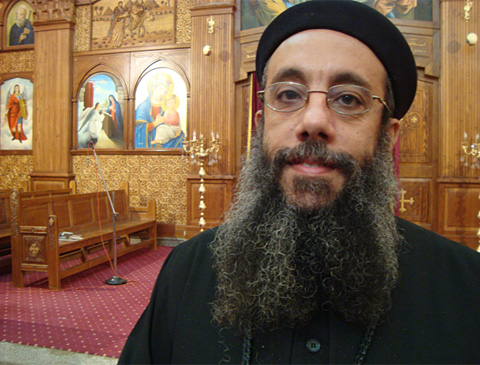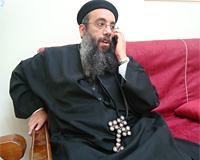Egypt’s elections: ‘The revolution is rebuilding Mubarak’
by - 6th December 2011

The faultlines in Egyptian politics do not fall in obvious places. Abouna Filopater who led the 9 October protest outside the Maspero TV station in Cairo that ended with 27 people being shot dead or crushed by tanks, is a Coptic priest who was himself in the army.
Street children reach for him as he gets out of the car. His mobile phone rings ceaselessly – a monastic bell chime. He laughs easily but also bites his finger nails. He is in mourning, despite the ready smile.
‘I feel severe sorrow. We love the Egyptian army very much and it is our army and I was an officer in it.’
He points to his shoulder as if to indicate his two stars earned in the engineering division over three years at the central military base in Cairo.
‘We never expected the army might kill Egyptian citizens and run over them and use live fire against them.
‘The military council [the ruling group led by Field Marshall Tantawi] gave them protection and didn’t stop it.’
This is contested, but the overwhelming weight of evidence even from the National Council for Human Rights – a government institution – indicates the military council were to blame for the attack on protesters marching against recent church burnings in Alexandria, Imbaba and most recently Edfu in the south.
The army used electric batons and fired into the area. He says categorically that the MC are ‘liars’ when they deny it.
‘Police tried to attack me on the 9th but a number of Muslims protected me and took me into the Ramses Hilton and I stayed there until 1pm the next day.’
He says he will continue to speak out. ‘There’s no idea of fear. We have a message whether outside or inside the church: We demand our rights and we will speak the truth.’
He also believes that the notoriously pragmatic Pope Shenouda approves of his activism.
‘El Baba – I don’t think I have done anything wrong as far as he is concerned, or against the church and I never speak on behalf of the church. I speak on my own behalf. If I have done anything wrong of course he would punish me like when I made a mistake in 2005.’
Shenouda suspended Filopater – it means ‘love of the father’ - for two years from 2005-7 for writing a series of anti-Mubarak articles in The Voice of the Nation and other publications. He said that the Copts were between the hammer of the national party and the anvil of the Muslim Brotherhood.
Some ex-pats play down the persecution narrative, and insist that Copts run into trouble only when they attempt to change the status quo by building new churches, or expanding old ones.
This view is dangerous according to Revd Jos Strengholt, Cairo’s new Anglican Chaplain, because it plays into the hands of the ruling council.
A journalist and Arabic speaking former Middle East Correspondent for the Dutch media, he says: ‘There can be absolutely no doubt that the revolution we are getting is not the one the liberal dreamers who initiated the revolution wanted.
‘For the historic churches here, and for the middle classes that make the country work, the future looks bleak.
‘I have already in my own Egyptian congregation [one of four run from St Michael’s Church in Heliopolis] some people, upholsterers, who have had no salary for a year. The work isn’t there. The local economy is at a standstill.’
 Filopater himself is not a ‘persecutionist’, playing up the strife for an often foreign audience that increasingly seeks to dragoon Christians into a fight with Islam Egyptian do not want. The Military Council he believes incites tensions by not holding extremist sheikhs accountable when churches burn.
Filopater himself is not a ‘persecutionist’, playing up the strife for an often foreign audience that increasingly seeks to dragoon Christians into a fight with Islam Egyptian do not want. The Military Council he believes incites tensions by not holding extremist sheikhs accountable when churches burn.
It can then pass itself off as the strong-arm defender of national unity against religious divisions that fester only because of legal impunity.
‘They want to rebuild the regime of Mubarak so they use differences that exist between Muslims and Christians.
‘They are doing this to increase the tensions in society and people will want to go back to Mubarak and say there was peace then. They have tried to do the same thing between judges and lawyers and cover up the corruption that existed in the Mubarak regime.
‘The extremists are being used by men who want power.’
The first round election results in which the Muslim Brotherhood won 40% of the vote and the Salafists 20% are all the more ominous therefore.
BETSY HIEL, Arabic speaking doyenne of foreign correspondents in Cairo is smoking more than usual, if that were possible. Pulling heavily on her third cigarette since getting back to her apartment in Zamalek, just a short walk from Tahrir Square, she says all her friends are depressed.
‘You can hear it in their voices. I am not very optimistic. The bad guys have an idea and they are organized’, she says.
Betsy’s been covering foreign affairs for the Pittsburgh Tribune from Cairo for 14 years. Her latest piece encompasses sources from the Muslim Brotherhood and the Salafis – including a 27-year old Sarry Gallal Ahmed, 27, a fully veiled female candidate of the Salafist Nour Party.
(Salafists look back to ‘the ancestors’ and seek to return society to a primordial Islam.)
Betsy shows me a picture on her iPod: she’s standing between two heavily veiled women in black, one of whom is presumably Ahmed, who believes Egypt must be introduced to religion gradually.
‘Capital punishments of Islam -- they can't be implemented instantly’, Hiel quotes Ahmed as saying. ‘We have been living for 30 years so far from our religion.
‘Sayyid Qutb said we don't drag people into religion by chains; we guide them,’ she said, quoting the Muslim Brotherhood writer who inspired al-Qaida and other Islamist groups.
Abouna Filopater agrees with the general pessimism. ‘The Muslim Brotherhood are known for their extremism and they are known as people who don’t accept the other. They are known for considering democracy as unbelief – kufr. They are known for a bloody manner of working in various periods of time, even if now they have a political discourse that’s different.
‘I was the first priest to write against Mubarak and his corruption and our problem is we are going to change a military dictatorship into a religious dictatorship, and this is more dangerous.’
Filopater and his Maspero Youth Union co-leader Abouna Metias are determined to keep going, whatever the cost.
Their aim is a civilian presidential council and then a civilian constitution – but with the US still investing $1.5billion a year in the army, which is run as a kind of capitalist fiefdom by the military council, this may be a long march.
‘We are going to continue our peaceful and non-violent efforts and defend our presence as Egyptians, as martyrs, and also as Christians. We are going to try to strengthen our cooperation with the moderate Muslims and the liberals, and I think we shall be successful in this, because everyone is annoyed at the Islamist threats.’
- Log in to post comments
